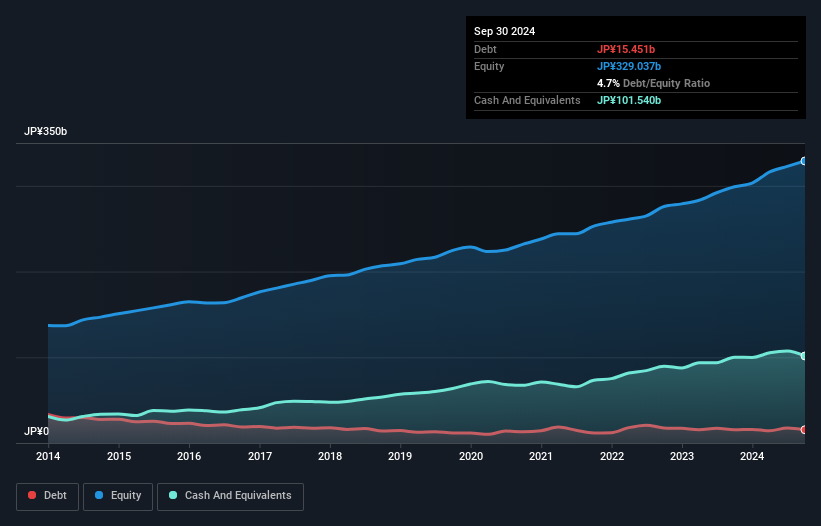- Japan
- /
- Entertainment
- /
- TSE:9605
These 4 Measures Indicate That Toei Company (TSE:9605) Is Using Debt Reasonably Well
David Iben put it well when he said, 'Volatility is not a risk we care about. What we care about is avoiding the permanent loss of capital.' So it seems the smart money knows that debt - which is usually involved in bankruptcies - is a very important factor, when you assess how risky a company is. Importantly, Toei Company, Ltd. (TSE:9605) does carry debt. But should shareholders be worried about its use of debt?
When Is Debt Dangerous?
Debt assists a business until the business has trouble paying it off, either with new capital or with free cash flow. If things get really bad, the lenders can take control of the business. However, a more common (but still painful) scenario is that it has to raise new equity capital at a low price, thus permanently diluting shareholders. Of course, debt can be an important tool in businesses, particularly capital heavy businesses. When we examine debt levels, we first consider both cash and debt levels, together.
View our latest analysis for Toei Company
What Is Toei Company's Net Debt?
As you can see below, Toei Company had JP¥15.5b of debt, at September 2024, which is about the same as the year before. You can click the chart for greater detail. But it also has JP¥101.5b in cash to offset that, meaning it has JP¥86.1b net cash.

How Healthy Is Toei Company's Balance Sheet?
We can see from the most recent balance sheet that Toei Company had liabilities of JP¥58.2b falling due within a year, and liabilities of JP¥39.8b due beyond that. Offsetting this, it had JP¥101.5b in cash and JP¥37.8b in receivables that were due within 12 months. So it actually has JP¥41.3b more liquid assets than total liabilities.
This surplus suggests that Toei Company has a conservative balance sheet, and could probably eliminate its debt without much difficulty. Simply put, the fact that Toei Company has more cash than debt is arguably a good indication that it can manage its debt safely.
Fortunately, Toei Company grew its EBIT by 6.2% in the last year, making that debt load look even more manageable. When analysing debt levels, the balance sheet is the obvious place to start. But ultimately the future profitability of the business will decide if Toei Company can strengthen its balance sheet over time. So if you're focused on the future you can check out this free report showing analyst profit forecasts.
But our final consideration is also important, because a company cannot pay debt with paper profits; it needs cold hard cash. While Toei Company has net cash on its balance sheet, it's still worth taking a look at its ability to convert earnings before interest and tax (EBIT) to free cash flow, to help us understand how quickly it is building (or eroding) that cash balance. During the last three years, Toei Company produced sturdy free cash flow equating to 58% of its EBIT, about what we'd expect. This free cash flow puts the company in a good position to pay down debt, when appropriate.
Summing Up
While we empathize with investors who find debt concerning, you should keep in mind that Toei Company has net cash of JP¥86.1b, as well as more liquid assets than liabilities. So is Toei Company's debt a risk? It doesn't seem so to us. Over time, share prices tend to follow earnings per share, so if you're interested in Toei Company, you may well want to click here to check an interactive graph of its earnings per share history.
Of course, if you're the type of investor who prefers buying stocks without the burden of debt, then don't hesitate to discover our exclusive list of net cash growth stocks, today.
Valuation is complex, but we're here to simplify it.
Discover if Toei Company might be undervalued or overvalued with our detailed analysis, featuring fair value estimates, potential risks, dividends, insider trades, and its financial condition.
Access Free AnalysisHave feedback on this article? Concerned about the content? Get in touch with us directly. Alternatively, email editorial-team (at) simplywallst.com.
This article by Simply Wall St is general in nature. We provide commentary based on historical data and analyst forecasts only using an unbiased methodology and our articles are not intended to be financial advice. It does not constitute a recommendation to buy or sell any stock, and does not take account of your objectives, or your financial situation. We aim to bring you long-term focused analysis driven by fundamental data. Note that our analysis may not factor in the latest price-sensitive company announcements or qualitative material. Simply Wall St has no position in any stocks mentioned.
About TSE:9605
Toei Company
A content company, engages in the production and distribution of movies, television (TV) shows, and other video products in Japan.
Flawless balance sheet with solid track record.
Market Insights
Community Narratives



